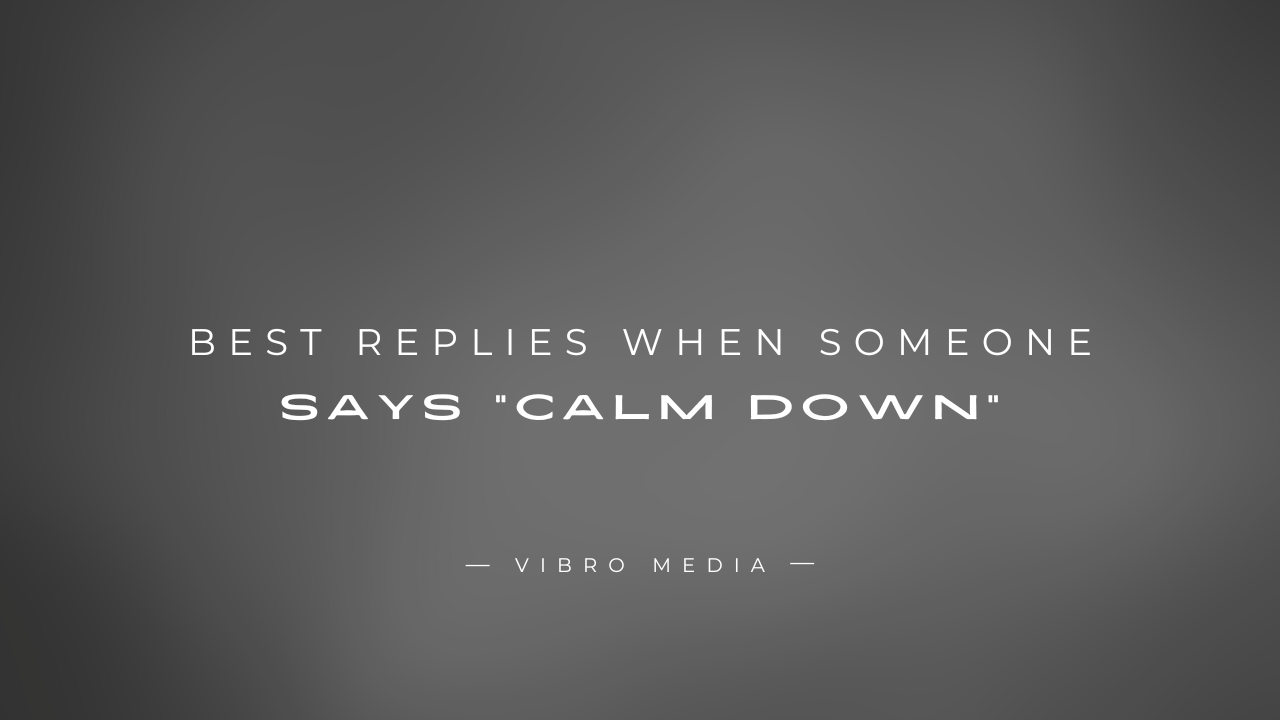Have you ever been in a heated conversation, only for the other person to hit you with the dreaded phrase, “Calm down”? It’s one of those statements that can turn a small disagreement into a full-blown argument. Hearing it might make you feel invalidated or patronised, even if the other person meant well. But how should you respond when someone tells you to “Calm down”?
In this article, we’ll explore why “Calm down” can be so triggering and how to handle it gracefully without escalating the situation. Let’s dive into understanding this loaded phrase and how to navigate these emotional waters.

200+ Replies When Someone Says “Calm Down”
Assertive Replies
- I need you to listen rather than tell me how to feel.
- I’m not out of control; I’m just expressing my thoughts.
- Your suggestion doesn’t address the issue at hand.
- I’m perfectly capable of managing my emotions, thank you.
- I appreciate your input, but I’m handling this.
- This is important to me, and I want to discuss it.
- I can take a breath without being told to calm down.
- I’m not raising my voice; I’m just passionate.
- Calmness doesn’t mean ignoring my feelings.
- I’ll decide when to calm down, not you.
Clarifying Replies
- What makes you think I need to calm down?
- Can you tell me why my emotions bother you?
- What part of this conversation feels too intense for you?
- Are you reacting to what I’m saying or how I’m saying it?
- Is there a specific reason you’re telling me to calm down?
- What should I be doing instead?
- How would you feel if you were in my position?
- What’s your understanding of what I’m upset about?
- Please help me see your perspective on this.
- What would make this situation better?
Empathetic Replies
- I know you mean well, but I need to vent a bit.
- I appreciate your concern; I just need to express myself.
- It’s hard for me to calm down when I feel this strongly.
- I understand you’re trying to help; can we talk it through?
- I can see this makes you uncomfortable; let’s find common ground.
- I’m feeling overwhelmed, and I need to get it out.
- You want things to be smooth, but I need to feel heard.
- I appreciate your support; I just need a moment.
- I understand where you’re coming from; this is how I process.
- Thank you for being concerned; I just need to work through this.
Humorous Replies
- Calm down? I thought I was auditioning for a drama!
- I’m as calm as a cat in a sunbeam!
- Calm down? But I’m in the middle of an epic saga!
- If I calm down any more, I might fall asleep!
- I’m trying to channel my inner Zen master—how’s it going?
- Do you have a ‘calm down’ button I can press?
- If I calm down any further, I’ll be horizontal!
- I promise I won’t start throwing things—yet!
- Calm down? Is that a new yoga pose?
- I’d calm down, but then I’d miss out on all this excitement!
Sarcastic Replies
- Oh, thanks! I’ve been waiting for someone to tell me that.
- Why didn’t I think of that? Instant peace of mind!
- Oh yes, because that’s always worked for everyone else.
- Great advice! I’ll just add it to my ‘not helpful’ list.
- Wow, you should teach a class on calming techniques!
- Sure! Let me just press my ‘calm’ button.
- Oh, perfect! I’ll just flip the calm switch right now!
- Thanks for the tip! I’ll put it in my back pocket.
- I didn’t realise this was a calmness competition!
- Thanks for that profound insight. I’ll remember it for next time!
Reassuring Replies
- I’m okay; I just need to express my feelings.
- I promise I’m not about to lose it. I was just talking it out.
- I appreciate your concern; I’m managing my emotions.
- I’m in control; I just need to voice what’s on my mind.
- I can handle this; I just want to be understood.
- I’m working through it; I’ll be fine.
- Thank you for checking in, but I’m okay right now.
- I know it seems intense, but I’m okay with this.
- I’m just expressing my thoughts; it’s all good.
- I’ll find my way back to calm, I promise.
Reflective Replies
- I realise I might be a bit intense; let’s pause momentarily.
- I understand why you’re concerned; I’ll take a breath.
- It’s okay to feel emotions, and I’m trying to process mine.
- Let’s take a step back and reassess the situation together.
- Sometimes, expressing feelings is part of calming down.
- I can see how intense this looks; I’ll try to cool it.
- I need to process this; thanks for your patience.
- Let’s take a moment to collect our thoughts.
- I get that my emotions are strong right now; it’s how I cope.
- I’ll reflect on my communication; thank you for your input.
Deflective Replies
- Let’s focus on the issue at hand instead of my emotions.
- Can we table the calm discussion for now? I want to resolve this.
- I’m fine. Let’s get back to what matters.
- I appreciate your concern, but let’s address the topic first.
- This isn’t about my calmness; it’s about the situation.
- I’m here to talk about the problem, not my feelings.
- I’d rather discuss solutions than my emotional state.
- This is a conversation about the issue, not how I express myself.
- Can we redirect this? It’s not about calming down.
- Let’s stay focused on finding a resolution.
Firm Replies
- I won’t be told how to feel; I must express myself.
- Telling me to calm down isn’t helpful or appropriate.
- I’m handling my emotions, and I don’t need instruction.
- I’m not upset; I’m simply passionate about this.
- Please respect my feelings instead of dismissing them.
- I can express my thoughts without being told to calm down.
- I’ll decide when to calm down, not you.
- Your suggestion isn’t constructive right now.
- I’m fine with being intense; it’s part of my identity.
- Let’s focus on the conversation instead of my delivery.
Agreeable Replies
- You’re right; I could use a moment to breathe.
- Thanks for the reminder; I’ll try to collect my thoughts.
- I’ll take a moment to calm down before we continue.
- I appreciate your concern; I’ll work on relaxing.
- You make a good point; I’ll try to refocus.
- Fair enough! Let’s take a deep breath together.
- I’ll pause and take a moment to gather myself.
- I hear you; let’s try to keep things calm moving forward.
- I’ll do my best to approach this with a clearer mind.
- Thanks for pointing that out; I’ll try to cool it.
Support-Seeking Replies
- I need support right now, not someone telling me to calm down.
- Can you help me figure out why I’m feeling this way?
- I’d love to discuss my feelings if you’re open to it.
- It would help if you listened for a bit.
- I’m feeling overwhelmed; can we discuss this together?
- I need some understanding right now—can we talk?
- I’m struggling; can you help me work through this?
- I could use your support instead of being told to calm down.
- Can you share your thoughts on what I’m feeling?
- Let’s work through this together rather than dismissing it.
Blunt Replies
- Telling me to calm down isn’t going to work.
- I don’t need you to tell me how to feel.
- That’s not helpful; just let me express myself.
- I’m not here for your advice on emotions.
- I’m fine. Just let me talk.
- Your suggestion is different from what I need right now.
- That’s a bit condescending, don’t you think?
- I’ll calm down when I’m ready, not when you say.
- Honestly, that’s not what I need to hear.
- Please stop with the ‘calm down’ comments.
Thoughtful Replies
- I appreciate your concern; emotions are part of the conversation.
- It’s interesting how different people react to strong feelings.
- Maybe we can explore why I’m feeling this way together.
- Calmness is great, but so is expressing what I feel.
- My emotions are intense; let’s discuss what’s behind them.
- I value your perspective; let’s work through this constructively.
- Sometimes, it’s necessary to feel before we can calm down.
- Emotions can be overwhelming; it’s okay to acknowledge them.
- Can we look at the reasons behind my feelings instead?
- Discussing emotions can lead to better understanding.
Playful Replies
- Calm down? But I’m just getting warmed up!
- If I calm down any more, I’ll be a puddle!
- I can’t! The drama llama needs its spotlight!
- What’s the fun in calm? I like a little chaos!
- Do you want me to calm down or turn into a Zen statue?
- Calm down? No, I’m practising my passionate speech!
- If I calm down, who will keep the excitement alive?
- I’m like a microwave—just heating up!
- Calm down? I’ll consider it after my next performance!
- But then I wouldn’t be able to channel my inner diva!
Vulnerable Replies
- Honestly, I’m feeling overwhelmed right now.
- I’m struggling to keep my emotions in check.
- I appreciate your concern; I just need to express this.
- I feel lost, and I need to talk it out.
- I’m unsure how to calm down when feeling this way.
- I wish I could, but I’m just really emotional right now.
- It’s hard for me to calm down when I feel so strongly.
- I feel vulnerable right now; can we talk instead?
- I’m just trying to sort through my feelings, and it’s tough.
- I need a little understanding; I’m feeling pretty raw.
Philosophical Replies
- Is calmness the ultimate goal, or is it okay to feel deeply?
- What does it mean to be calm in a passionate moment?
- Maybe emotions are just the body’s way of processing experiences.
- Isn’t it human to feel intensely? Shouldn’t we embrace that?
- Can we separate calmness from authenticity in our feelings?
- Isn’t the journey through emotions what makes us human?
- Why do we value calmness overexpression? Isn’t both important?
- What if feeling strongly is a part of understanding ourselves?
- Isn’t it natural to have waves of emotion? They’re part of life.
- Could our society benefit from embracing more emotional honesty?
Reflective Self-Awareness Replies
- I see how I might appear intense; I’ll try to tone it down.
- I realise I’m not angry; I’m just passionate about this topic.
- My feelings might seem overwhelming right now.
- I can be intense; it’s part of how I process my thoughts.
- I’m aware that expressing my feelings can be jarring at times.
- I get that my emotions are strong; I’m just trying to express myself.
- I’m reflecting on how I communicate; thank you for your patience.
- I could approach this more calmly.
- I’m aware of how I come across; I appreciate your feedback.
- I’ll take a moment to reflect on how to express this better.
Boundary-Setting Replies
- I appreciate your concern, but I need to express myself right now.
- Please don’t tell me how I feel; I must process this.
- I’m not seeking advice on my emotions; I just need to vent.
- Can we focus on the issue instead of my emotional state?
- I need the space to express how I feel without being interrupted.
- Let’s talk about the situation, not how I react.
- I’m setting a boundary here; I’ll calm down when ready.
- I’d prefer it if you didn’t instruct me on my feelings.
- I’m not interested in being told to calm down; I want to be heard.
- I need to express my thoughts without being told to settle down.
Positive Reframing Replies
- I’m just really passionate about this; it shows I care!
- My intensity means I’m engaged and invested in this topic.
- Feeling strongly is just my way of showing enthusiasm.
- This is an opportunity to express my true feelings.
- This passion shows my commitment; let’s channel it positively.
- Strong emotions can lead to meaningful conversations!
- It’s great to feel deeply; it means I’m alive and present.
- My energy is just my way of bringing enthusiasm to the table.
- I’m embracing my feelings; it’s part of who I am!
- This intensity can lead to growth and deeper understanding.
Teachable Moment Replies
- You know, telling someone to calm down often makes them feel dismissed.
- It’s important to understand that strong emotions can lead to productive discussions.
- Next time, let’s focus on why I feel this way rather than telling me to calm down.
- This moment shows how expressing feelings can lead to deeper conversations.
- Emotions are a natural part of communication; they can be valuable.
- Instead of calmness, how about we explore the root of my feelings?
- Let’s use this as a chance to discuss emotional awareness.
- It might be helpful to acknowledge emotions instead of brushing them aside.
- Understanding feelings can help us connect better; let’s dive in.
- This is a great example of why we should embrace emotional expression.
What Does “Calm Down” Really Mean?
On the surface, “Calm down” seems like a simple request to dial back your emotions. It’s often used when someone perceives you’re getting too worked up or emotionally intense. Theoretically, they might just be trying to help you regulate your emotions. However, in practice, it often comes across as dismissive.
Whether in an argument with a friend, a disagreement at work, or even during a discussion with a loved one, being told to calm down can trigger unexpected reactions.
Why “Calm Down” Can Trigger Negative Reactions
When someone tells you to “Calm down,” it can feel like they’re downplaying your feelings. Think about it: you’re upset, passionate, or stressed, and suddenly, they tell you to control those emotions as if they don’t matter. This can lead to feelings of frustration or even anger. It’s natural to want your emotions to be acknowledged, not brushed aside.
Many people hear “Calm down” as “You’re overreacting” or “Your feelings aren’t valid.” This perception of being invalidated or not taken seriously can cause even more emotional intensity.
Understanding the Person Saying “Calm Down”
Before reacting, it’s helpful to step back and consider why the person said it. Often, they may not mean any harm. They could feel overwhelmed and unsure how to handle the intensity of their emotions. Sometimes, “Calm down” is a misguided attempt to diffuse the situation quickly.
That said, it’s essential to discern between someone genuinely trying to help and dismissing your feelings.
How to Stay Composed When Someone Says “Calm Down”
Your first instinct might be to react defensively, but staying calm is the key. Here are some steps to take when you hear the phrase:
- Recognise Your Emotions: Notice if you’re angry, hurt, or frustrated. Acknowledging your emotions can prevent an automatic defensive reaction.
- Pause and Breathe: Take a deep breath to slow down the rush of emotions. A few breathing moments give you the clarity to respond more thoughtfully.
Responding in a Productive Manner
Instead of snapping back, try to stay calm and composed. It’s easier said than done, but responding gracefully can de-escalate the situation. Acknowledge both your feelings and the intent behind their comment.
For example, you can say:
- “I understand you’re asking me to calm down, but I’m feeling very passionate about this right now.”
- “I hear you, but it’s important to me that my feelings are recognized.”
This shows that you’re not ignoring the request but standing up for your emotional state.
Why Defensiveness Doesn’t Help
When someone tells you to “Calm down,” it’s easy to feel attacked or belittled. That’s when defensiveness can kick in. You might be tempted to fire back with something like, “Don’t tell me to calm down!” But here’s the problem: defensiveness often leads to more conflict.
Defensiveness puts the other person on edge, escalating the situation further. Rather than calming down, both sides become more emotionally charged.
Turning “Calm Down” Into an Opportunity
Believe it or not, hearing “Calm down” can be an opportunity to strengthen communication. It allows you to reflect on your emotional state, express yourself more clearly, and better understand the other person.
By responding with curiosity instead of anger, you can turn the phrase into a moment for growth. Try asking, “Why do you feel like I need to calm down?” This invites the other person to share their perspective, which can lead to a more constructive conversation.
Understanding Your Triggers
Words have power, and “Calm down” is a phrase that can push buttons. But why is that? Often, the intensity of our reaction has more to do with our past experiences than the present situation. Maybe you’ve been dismissed in the past, or you’ve had your emotions invalidated before. Reflecting on these triggers can help you manage your responses in the future.
Effective Communication Techniques in Emotional Situations
When emotions run high, communication can break down quickly. Here are a few techniques to keep conversations on track when things get heated:
- Active Listening: Before responding, ensure you’re truly listening to what the other person is saying. This shows that you value their perspective.
- Assertive Speaking: Instead of being passive or aggressive, aim to speak assertively. This means expressing your feelings and needs without being forceful or harsh.
Maintaining Healthy Boundaries During Heated Discussions
Sometimes, in emotionally charged situations, it’s essential to set boundaries. If the conversation gets too intense, asking for a break is okay. You can say, “I need a moment to gather my thoughts. Let’s revisit this in a few minutes.” A short break can help both parties cool down and return with clearer heads.
What To Do If “Calm Down” Escalates Conflict
Sometimes, being told to “Calm down” can worsen the situation, especially if it’s repeated or said condescendingly. If this happens, the best thing you can do is focus on de-escalation.
One tactic is to stay calm and speak slowly. When you slow down your speech, it has a calming effect on the entire conversation. If the conflict escalates, it might be best to disengage temporarily.
The Role of Emotional Intelligence
Emotional intelligence plays a significant role in how we handle stressful interactions. Self-awareness, empathy, and emotional regulation can help you manage your reactions and respond in a way that promotes understanding rather than conflict.
Conclusion
In conclusion, knowing how to respond when someone tells you to “calm down” can make all the difference in maintaining your cool and making a point. Whether aiming for humour, wit, or a thoughtful comeback, having the right words at hand can turn a frustrating situation into one you can handle with confidence. And if you’re looking for even more clever ways to respond in other tricky conversations,
Check out our guide on:
200+ Responses to “I Miss You” That Will Melt Their Heart
FAQs
Q. What should I do if I can’t stay calm?
If you’re struggling to calm down, step back from the conversation. Deep breathing, a short walk, or journaling can help you process emotions before re-engaging.
Q. How do I express my emotions without causing conflict?
Use “I” statements to express your feelings without blaming others. For example, “I feel frustrated because…” rather than “You make me feel…”
Q. Is it okay to tell someone else to “Calm Down”?
While it might seem helpful, telling someone to “Calm down” can often be counterproductive. Instead, try asking them what they need or how you can help.
Q. How can I stop someone from telling me to “Calm Down”?
If you feel comfortable, explain how the phrase affects you. You can say, “When you tell me to calm down, it makes me feel dismissed.”
Q. Can mindfulness help in these situations?
Absolutely! Mindfulness can help you stay grounded and aware of your emotions, making responding thoughtfully rather than impulsively easier.











1 thought on “200+ Best Replies When Someone Says “Calm Down””